President Ivo Josipović told a joint IPI/SEEMO delegation in Zagreb that he is against proposed changes to his country's criminal code that would impose severe penalties for libel, including jail.
(IPI/IFEX) – 28 January 2011 – Croatian President Ivo Josipović said today that he opposes proposed changes to his country’s criminal code that would impose severe penalties for libel, including jail.
The president told a joint delegation of the International Press Institute (IPI) and the South East Europe Media Organisation (SEEMO) at a meeting at his office in Zagreb that he was against the draft proposal, and he called on other countries to remove libel provisions from their penal codes.
“I am against jail for public announcers, journalists, etc.,” he said, but he noted that efforts to stop the proposal have been diminished by the presence of similar laws in the criminal codes of other European states. According to human rights advocacy group ARTICLE 19, nearly all Western European countries retain criminal defamation provisions on their books.
The proposal, which also addresses insults and embarrassment to honour and reputation, comes as part of a draft penal code under discussion by a government working committee. Under language unveiled for public debate last week, a journalist found guilty of libel could face imprisonment of up to a year and a fine equalling half of the journalists’ annual wage.
Zdenko Duka, president of the Croatian Journalists Association, said that truth was not a defence to libel charges under the proposal, and that journalists could be subject to
penalties for reporting items judged not to be in the public interest.
Josipović said the government should rely on civil, rather than criminal remedies, and he added that he supported making civil remedies stronger and more efficient. However, he also called on journalists to hold themselves to higher standards in their reporting.
“Journalism is a very powerful profession, and people’s destiny depends on it,” he explained. “Their moral destiny, their social destiny, their economic destiny. There needs to be some responsibility.”
IPI Acting Director Alison Bethel McKenzie praised the president’s position, commenting:
“We’re pleased that the president is against this draft legislation and that he ensured us he would do everything in his power to have jailing of journalists removed from the legislation. We understand the president’s concerns about low standards of journalism in some areas, and we will work more closely with the Croatian Journalists Association to improve standards and opportunities for the media in Croatia.”
Bethel McKenzie commented that the IPI would seek to hold Josipović to his promise, and agreed that “the criminalisation of defamation is not acceptable anywhere in the world.”
SEEMO Secretary General Oliver Vujovic said:
“We are glad that the president is supporting the removal of fines and jail time in this draft law. It shows that the leading politicians in the country are dedicated to guiding Croatia to EU membership.”
Before the proposal can become law, it must still go before Croatia’s justice ministry, which would then finish a draft and send it to the government before any legislation would be presented before parliament.
The joint delegation met with the president this morning as part of a four-day press freedom mission to Croatia by IPI and SEEMO that began Tuesday.


